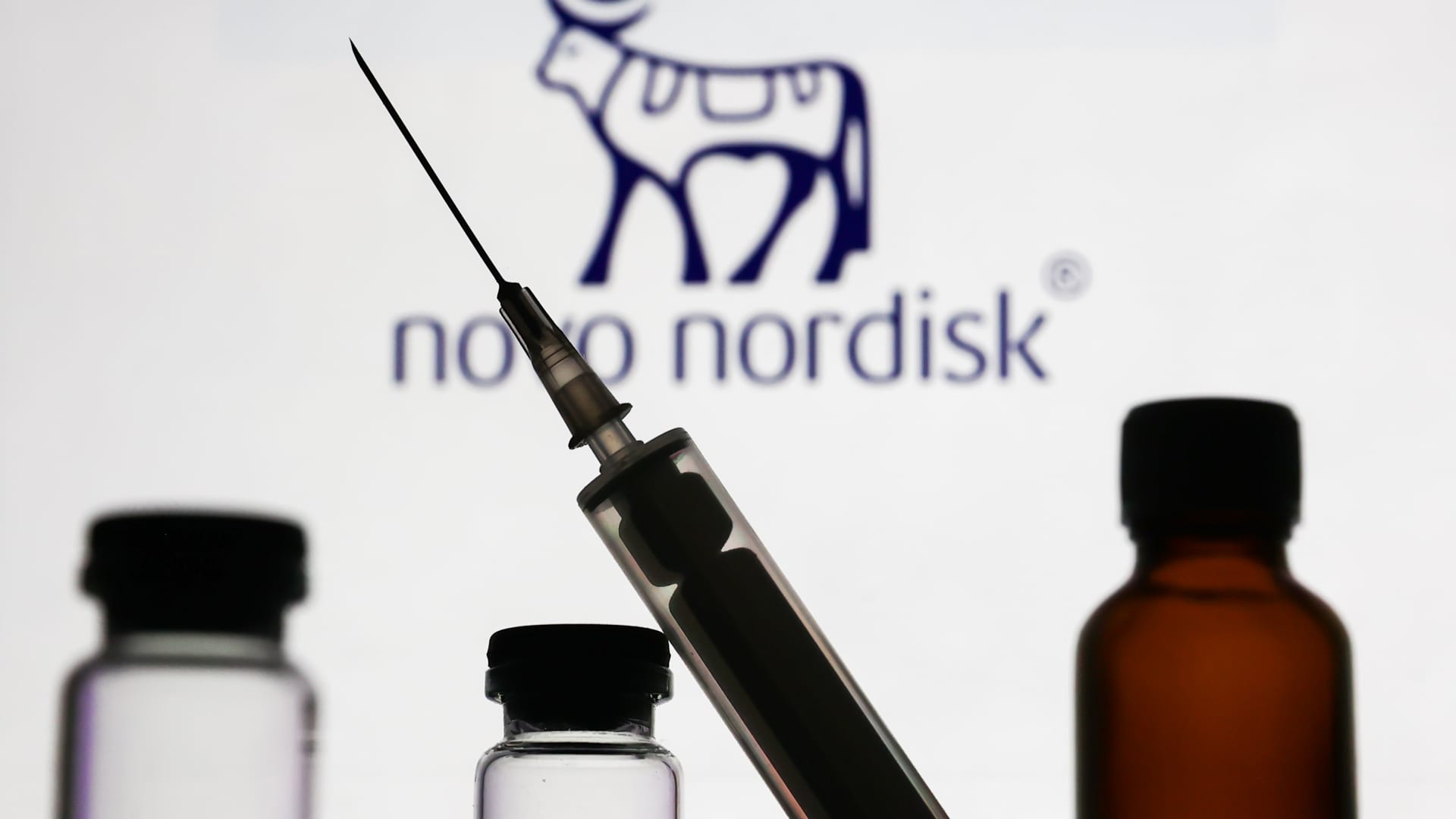Medical bottles and syringe are seen with Novo Nordisk logo displayed on a screen in the background.
Nurphoto | Nurphoto | Getty Images
Shares of Novo Nordisk rose on Wednesday after the company reported better-than-expected net profit in the fourth quarter amid soaring demand for its Wegovy obesity drugs, but forecast a slight slowdown in sales for 2025.
Net profit at the Danish pharmaceutical behemoth rose 29% annually to 28.23 billion Danish kroner ($3.98 billion) in the fourth quarter, versus the 26.09 billion Danish kroner anticipated by analysts in a Factset poll late Tuesday.
Full-year net profit climbed 21% to 100.99 billion Danish kroner, also beating estimates of 99.14 billion Danish kroner for 2024.
The drug maker posted a 107% year-on-year increase in Wegovy sales to 19.87 billion Danish kroner ($2.76 billion) in the three months to the end of December, slightly missing the 20.02 billion Danish kroner forecast by analysts.
Novo Nordisk shares pared gains slightly to trade up 3.1% by 11:15 a.m. London time. Shares of obesity drug rival Eli Lilly, meanwhile, were up 1.7% in premarket trade.
Speaking to CNBC Wednesday, CEO and President Lars Fruergaard Jørgensen said that the company now expects to be able to bring a weight loss pill to the U.S. market before Eli Lilly. Both Novo Nordisk and Eli Lilly’s current weight loss treatments are administered via injection, but oral formats are considered the next frontier in expanding patient accessibility.
“We actually think we can compete in the U.S. market with tablet-based treatment before Lilly can launch,” Jørgensen told CNBC’s Silvia Amaro.
Jørgensen said that Novo Nordisk would submit its oral treatment for U.S. regulatory approval “within a couple of months” with a view to launching next year. Lilly is currently developing an oral obesity pill, Orforglipron, which it said last month could receive regularly approval by early 2026.
“We have a really broad portfolio of different, say, biologies — also both injectable and tablet-based — and that really caters for a strong position in catering for many different patient needs from both an efficacy point of view and a convenience point of view,” Jørgensen added.
Overall sales at the company — which also produces diabetes and rare disease treatments — increased 30% in the fourth quarter and 26% on the year at constant exchange rates. That growth was driven primarily by demand from the North America and Europe, Middle East and Africa regions.
Novo Nordisk forecast slower sales growth for 2025 of between 16% to 24% at constant exchange rates, below the 18% to 26% forecast for 2024. This forecast, the company said, reflected “intensifying competition and continued pricing pressure within Diabetes and Obesity care” market.
However, Jørgensen said the lower forecast reflected “continued, steady growth” against a higher baseline.
“If you do the math, actually what we are adding in terms of volume new patients in 2025 is the same as what we add[ed] in 2024,” he said. “As the base gets bigger and bigger, the relative growth becomes smaller. So it’s really about continued serving of patient living with diabetes [and] obesity, both in the U.S.”
Susannah Streeter, head of money and markets at Hargreaves Lansdown, said the wide range in guidance indicated that Novo Nordisk’s current market share could be slowing, while adding that there nevertheless remains “a long way to run” for obesity drugs given their broad perceived health benefits.
“A further acceleration will depend on more expanded use cases being approved by health regulators,” she added.
Novo Nordisk has ridden a wave of rising global demand for GLP-1 agonist obesity treatments. GLP-1s, which form the basis of Novo's Wegovy and rival Eli Lilly's Zepbound, work by mimicking a hormone called glucagon-like peptide-1, which suppresses appetite.
Investors have now been eagerly awaiting updates on the company's other obesity drug candidates, including its hotly anticipated experimental CagriSema treatment. Late-stage CagriSema trial results disappointed markets in December after demonstrating average weight reduction of 22.7%, below the 25% Novo had previously forecast.
The trial results dealt a blow to expectations that CagriSema would emerge as Novo's next-generation obesity drug, combining semaglutide — the active ingredient in Wegovy — with amylin analog Cagrilintide, a nascent form of weight loss treatment.
However, positive early-stage results for its once weekly Amycretin obesity drug, which similarly employs the amylin pancreas hormone, led the stock higher last month.
Novo Nordisk said Wednesday that it would conduct a further study of CagriSema in 2025 with a view to filing for regulatory approval in the first quarter of 2026.
Jørgensen also dismissed concerns around the tolerability of CagriSema, saying that the data suggests the treatment is "very safe and also well tolerated."
"We will be doing one more trial to further seek out the full potential of CagriSema, because we believe there's more to be delivered by extending treatment period a bit," he noted.
[ad_2]
Source link

